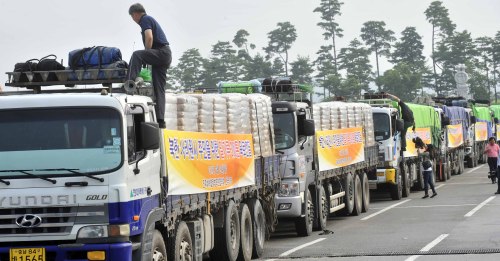North Korean envoy Kim leaves for New York, expected to hold talks Thursday
While South Korea and the U.S. are seemingly very much together in dealing with North Korea patiently, the allies may find themselves in different positions after the upcoming Pyongyang-Washington talks, analysts and officials here said Tuesday.
Pyongyang’s First Vice Foreign Minister Kim Kye-gwan reportedly left for New York Tuesday to discuss the next necessary steps in reviving the long-stalled six-nation negotiations aimed at disarming the North of its nuclear weapons.
While South Korea and the U.S. are seemingly very much together in dealing with North Korea patiently, the allies may find themselves in different positions after the upcoming Pyongyang-Washington talks, analysts and officials here said Tuesday.
Pyongyang’s First Vice Foreign Minister Kim Kye-gwan reportedly left for New York Tuesday to discuss the next necessary steps in reviving the long-stalled six-nation negotiations aimed at disarming the North of its nuclear weapons.

The invitation to the North by U.S. Secretary of State Hillary Rodham Clinton came on the heels of last week’s security forum in Indonesia, during which chief nuclear envoys of the two Koreas met for the first time since the denuclearization talks collapsed in 2008. During the meeting, the two officials agreed to work on “an early resumption” of the multinational talks that also involve the U.S., China, Russia and Japan.
Although Clinton did not unveil the exact schedule of Kim’s trip, sources say he will meet with U.S. officials on Thursday.
Seoul and Washington have both warned against rash optimism saying the upcoming talks won’t bring a “drastic improvement” to the current deadlock. While South Korean Foreign Minister Kim Sung-hwan said his government will deal with the changes “patiently,” Clinton said Washington won’t reward Pyongyang “just for” returning to the negotiation table.
But Pyongyang’s relations with the U.S. are highly likely to take a turn for the better via this week’s talks, analysts say, noting the possibility of Seoul losing the initiative in solving the issues related to the peninsula.
“The (South Korean) government has to make a diplomatic decision here,” said Yoon Duk-min, a researcher at the Institute of Foreign Affairs and National Security in Seoul.
As the North works on opening a direct dialogue channel with Washington, Seoul needs to “actively engage other dialogue partners” so as not to lose the initiative in resuming the six-nation talks, he said.
In a briefing in Washington, State Department spokesperson Victoria Nuland said discussions will be made over “what will be necessary to not only resume six-party talks but to improve direct engagement between the U.S. and the North.
“We want the North and the U.S. to stay on good terms, but not in a way that will shut us out,” a Seoul official said on the condition of anonymity.
Foreign Ministry spokesman Cho Byung-jae said his government expects Pyongyang and Washington to discuss “a wide range of issues” related to the two states.
But regardless of how the situation develops, South Korea is “still waiting for North Korea to apologize” for its deadly attacks last year, he said.
“The attacks resulted in great damage to the lives and properties of our people. We cannot just overlook this issue,” he said.
North Korea’s March attack against a Seoul warship and November bombarding of a border island have been a major obstacle in thawing the ice between the two Koreas.
Despite the apparent international pressure to resume dialogue with the North, public sentiment here has been blocking the government from making up with Pyongyang until it makes a proper apology. The North, which is technically still at war with the South, denies responsibility for the attacks that together killed 50 people.
South Korea will feel more pressured to let go of the issue should this week’s talks between the U.S. and North Korea go well, analysts say.
The South Korean government proposed holding government-level talks over the stalled cross-border tours to North Korea on Monday, indicating its determination not to lose the initiative in the ongoing process by staying close with Pyongyang. The two Koreas have not discussed the issue in 17 months.
“We cannot just sit and watch the North and the U.S. negotiating after holding one dialogue with the North,” a high-ranking Seoul official said, asking not to be named due to the sensitivity of the issue. “The two dialogues will go together.”
This week in New York, Kim, formerly Pyongyang’s top nuclear negotiator, is expected to meet with Stephen Bosworth, the U.S. special representative for North Korea affairs, in what would be their first meeting since Bosworth visited Pyongyang at the end of 2009.
China, host of the six-nation talks, suggested earlier this year to the dialogue partners the strategy of the two Koreas holding talks, followed by a Pyongyang-Washington dialogue and finally the six-party discussions.
As North Korea’s traditional allies, China and Russia have been supportive of seeing an early resumption of the six-nation talks while the U.S. and its two closest Asian allies Japan and South Korea have been more cautious.
The six-nation talks had been one of Pyongyang’s largest sources of outside assistance until they broke down in December 2008. The communist state has reportedly being suffering from deepening food shortages as well as international isolation ever since.
By Shin Hae-in (hayney@heraldcorp.com)





![[From the Scene] Monks, Buddhists hail return of remains of Buddhas](http://res.heraldm.com/phpwas/restmb_idxmake.php?idx=644&simg=/content/image/2024/04/19/20240419050617_0.jpg&u=20240419175937)




![[Graphic News] French bulldog most popular breed in US, Maltese most popular in Korea](http://res.heraldm.com/phpwas/restmb_idxmake.php?idx=644&simg=/content/image/2024/04/18/20240418050864_0.gif&u=)



![[From the Scene] Monks, Buddhists hail return of remains of Buddhas](http://res.heraldm.com/phpwas/restmb_idxmake.php?idx=652&simg=/content/image/2024/04/19/20240419050617_0.jpg&u=20240419175937)

![[KH Explains] Hyundai's full hybrid edge to pay off amid slow transition to pure EVs](http://res.heraldm.com/phpwas/restmb_idxmake.php?idx=652&simg=/content/image/2024/04/18/20240418050645_0.jpg&u=20240419100350)

![[Today’s K-pop] Illit drops debut single remix](http://res.heraldm.com/phpwas/restmb_idxmake.php?idx=642&simg=/content/image/2024/04/19/20240419050612_0.jpg&u=)